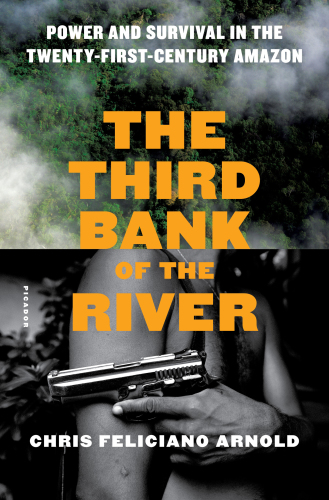
The Third Bank of the River
Power and Survival in the Twenty-First-Century Amazon
کتاب های مرتبط
- اطلاعات
- نقد و بررسی
- دیدگاه کاربران
نقد و بررسی

April 2, 2018
Arnold draws on his extensive reporting in the Brazilian Amazon and joins it with history, memoir, and travel writing in this well-crafted debut. The book starts with Arnold’s recollection of covering the 2014 FIFA World Cup matches in Manaus, a city in the Amazon rainforest, and closes as the torch relay passes through Manaus ahead of the 2016 Rio Olympics. In between, Arnold provides snapshots of major news stories in the Amazon region: the emergence of an isolated indigenous tribe beset first by drug traffickers and then disease; a war between organized crime and rogue cops; and the aftereffects of a huge hydroelectric dam project. Arnold also includes contextual history (the original colonization by the Spanish and Portuguese, the atrocities of the rubber trade) and his own personal story of returning to Brazil, his birthplace, at 25 after being adopted as a child and raised in the U.S. Arnold handles all of the narrative strands expertly and shows a keen eye for detail (“A middle-aged woman with bottle-blonde hair, she entertained a few questions as she counted up the wrinkled bills in her cash register”). The reader leaves with a newfound understanding of the diversity, complexity, and corruption to be found in the modern Amazon.

May 1, 2018
Journalistic account of the rush to develop the Amazon rainforest and its cost in human lives.When Luiz Inácio Lula da Silva, or Lula, became president of Brazil in 2002, he did so, writes Brazil-born, U.S.-raised journalist Arnold, by "rallying frustrated Brazilians around a call for sustainable development and a commitment to social justice." Those planks would not apply in the backwaters of the Amazon, for Lula also pressed for development that would make Brazil economically independent and even a power. For a while, it worked: The commodities market surged, poor Brazilians entered the middle class, middle-class Brazilians became rich, and everyone was happy. Except, that is, the undiscovered, "isolated" Indians of the interior, whose territory was overrun by miners and loggers and who were forcefully reminded continually that "poison-tipped arrows are no match for automatic rifles." There may be as many as 100 of these isolated tribes, writes the author, a greater number than anywhere in the world. Many of them are square in the path of annihilation, not just because of that rush into the rainforest for its hidden riches, but also due to a shrinking gene pool and diseases introduced from outside. Arnold chronicles his visits with scholars who are attempting to locate and account for these people without disrupting their lives, but theirs, too, is a race against time. As he observes, one Indian village that had been identified was soon thereafter abandoned and the location of the villagers unknown, even as "intelligence on the ground confirmed invaders nearby, wildcat prospectors on a quest for gold." The prognosis is grim. And so, too, is it for civil society in that developing outback, where, as Arnold writes, "extermination groups" and a militarized police force suppress dissent, the latter "blurring lines and rewriting laws with righteous badges in their pockets and handguns in their glove compartments."A saddening, maddening story that draws much-needed attention to crime without punishment in a remote--but not invisible--part of the world.
COPYRIGHT(2018) Kirkus Reviews, ALL RIGHTS RESERVED.

May 15, 2018
Photographs of South America's winding Amazon River often highlight the colorful greenery and wildlife living along its banks, painting an idyllic picture of this 4,300-mile waterway and the sprawling, ecologically rich region surrounding it. Yet, according to Brazilian-born journalist Arnold, the opulent jungle canopy barely conceals a dark underbelly of crime, political bribery, and environmentally devastating exploitation of the area's natural resources. Using Manaus, the Amazon basin's de facto capital city and center of Brazilian drug trade, as his starting point, Arnold focuses his attention on the rain forest's 100-plus threatened indigenous tribes and the shady businesses that regard these natives as roadblocks to development. Arnold contrasts the many ways corrupt loggers and miners are complicit in ethnic cleansing with accounts of the findings of the anthropologists who are trying to track and help these tribes. Arnold pulls few punches in this sobering account of the unfolding genocidal threat, adding another dark layer to the urgent story environmentalists are already telling about how the logging of rain forests is playing a drastically destructive role in climate change.(Reprinted with permission of Booklist, copyright 2018, American Library Association.)

























دیدگاه کاربران